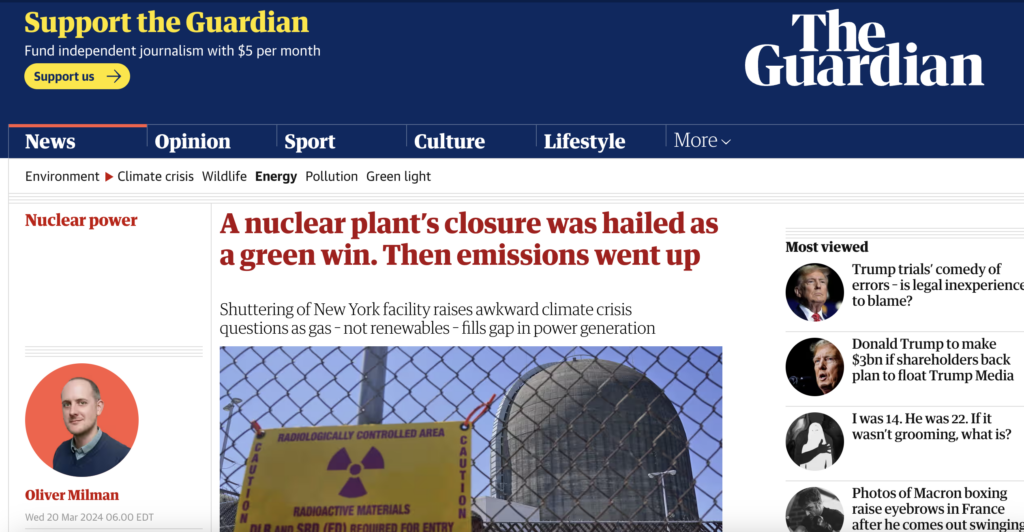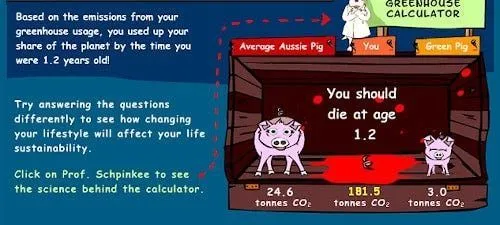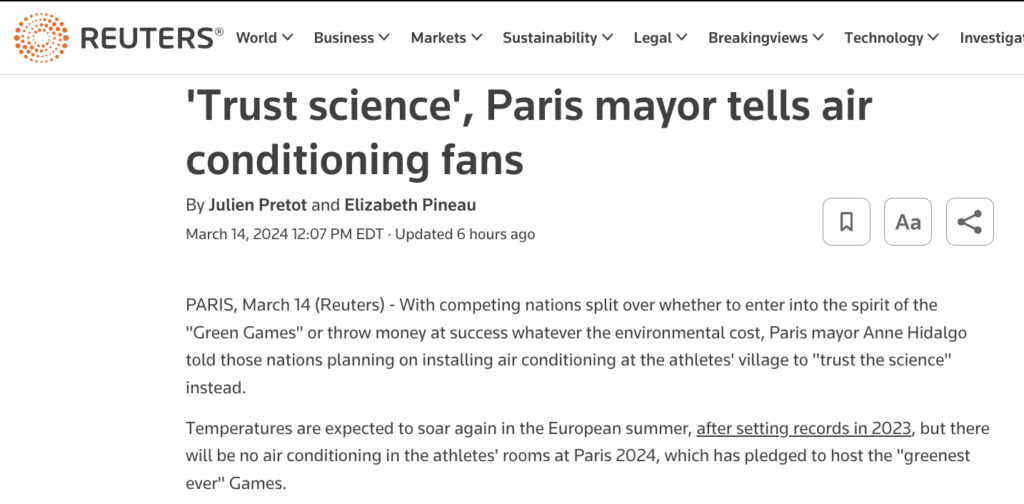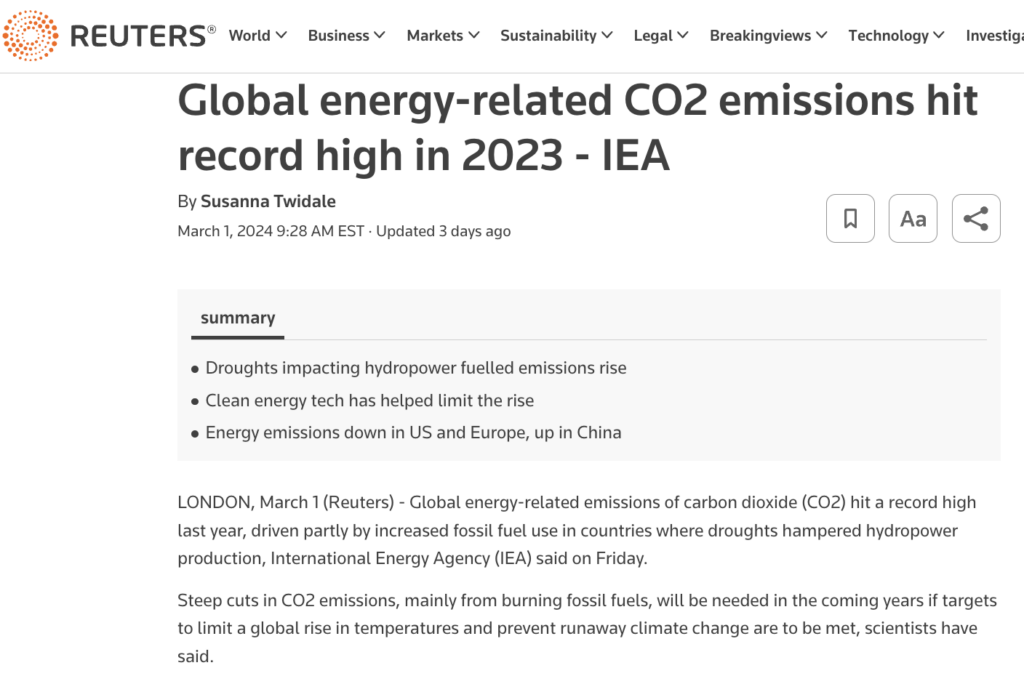UK Guardian: A nuclear plant’s closure was hailed as a green win. Then emissions went up – ‘Shuttering of facility raises awkward climate crisis’

https://www.theguardian.com/environment/2024/mar/20/nuclear-plant-closure-carbon-emissions-new-york When New York’s deteriorating and unloved Indian Point nuclear plant finally shuttered in 2021, its demise was met with delight from environmentalists who had long demanded it be scrapped. But there has been a sting in the tail – since the closure, New York’s greenhouse gas emissions have gone up. Castigated for its impact […]
Lab-grown meat — for pets!? ‘Pets eat more meat than’ children! Enter cells ‘replicated in a bioreactor, producing a chicken pâté-like dish’
British pets eat more meat than British children. … Pet animals account for 22 per cent of meat consumption in the UK. … globally, pets account for about 20 per cent of meat consumed. …
Enter the London tech firm Meatly, a start-up which has just produced its first tins of lab-grown meat for cat food. It makes real meat — in this case chicken — but without killing a single animal. Instead chicken cells are extracted from a hen’s egg and replicated in a bioreactor, producing a chicken pâté-like dish. The implications for animal welfare and the climate are clear.
WEBSITE TEACHES KIDS TO DIE AT CARBON LIMIT: ABC website tells kids when they should die

https://www.news.com.au/technology/abc-website-tells-kids-when-they-should-die/news-story/7ca875df4d93111901d7412aa58b6a49 By Karlis Salna AN ABC website has been accused of portraying farmers and forestry workers as evil and telling kids how much carbon they can produce before they die. The Planet Slayer website, which can be accessed via the science section on the ABC home page, also demonises people who eat meat and those […]
Now they are coming for your tires! Researchers say ‘tire emissions’ pose a threat to global health, & EVs could make ‘the problem worse’ – ‘Regulators are already scrambling to tackle this issue’

https://www.thedrive.com/news/tire-dust-makes-up-the-majority-of-ocean-microplastics-study-finds Tire Dust Makes Up the Majority of Ocean Microplastics, Study Finds – Researchers say tire emissions pose a threat to global health, and EVs could make the problem worse. BY LEWIN DAY When contemplating the emissions from road vehicles, our first thought is often about the various gases coming out of the tailpipe. However, new […]
‘Trust science’, Paris mayor boasts as city declares ‘there will be no air conditioning in Olympic athletes’ rooms ‘to cut the carbon footprint’ of summer Olympics

Reuters – March 14, 2024: There will be no air conditioning in the athletes’ rooms at Paris 2024, which has pledged to host the “greenest ever” Games. … Paris mayor Anne Hidalgo told those nations planning on installing air conditioning at the athletes’ village to “trust the science” instead… With climate scientists warning that global warming has produced more extreme weather patterns in much of the world, organisers of Paris 2024 have said they want to halve the carbon footprint compared with the Rio 2016 and London 2012 Summer Games. “I think we have to trust science on two counts. The first is what scientists are telling us about the fact that we are on the brink of a precipice. Everyone, including the athletes, must be aware of this,” said Hidalgo. “And secondly, we have to trust the scientists when they help us to construct buildings in a sober way that allows us to make do without air conditioning.” ..
Associated Press in 2023: The Paris Olympics is going underground to find a way to keep athletes cool at the 2024 Games without air conditioners…The decision is part of the organizing committee’s goal to cut the carbon footprint of the Paris Games by half and stage the most sustainable Olympics to date by installing a special technology to use natural sources to keep everyone cool even during a potential heat wave. Compared to a conventional project, the carbon impact will be reduced by 45% for the Athletes Village during the construction phase and over the entire Olympic cycle, she said. …
The geothermal energy system will ensure that the temperature in the athlete apartments in the Seine-Saint-Denis suburb does not rise above 26 degrees Celsius (79 degrees Fahrenheit) at night, including during a potential a heat wave, said Laurent Michaud, the director of the Olympic and Paralympic Villages. … “Despite outdoor temperatures reaching 41 degrees Celsius (106 degrees Fahrenheit), we had temperatures at 28 degrees (82 degrees Fahrenheit) in most of these rooms,” Michaud told The Associated Press, detailing the results of a heatwave simulation. … To keep the coolness inside, the athletes will have to follow some basic rules, he added, including making sure the window blinds are shut during the day. … Although some Olympic hopefuls have already expressed concern about the lack of air conditioning, Monnet said athletes should adapt and help contribute to fight against climate change. “We need athletes to set an example when they use the buildings,” Monnet said. “We can build the most virtuous village we want, it is also the use that will be made of it that will weigh on our carbon footprint.” …
Allow only AC in very limited circumstances: “It will be on a case-by-case basis, and for health and safety of the athletes,” Michaud said, adding that ventilators vaporizing water droplets could be installed instead of traditional air conditioning units.
Listen: Morano on Joe Piscopo Show on NYC approving green plan requiring pizzerias to cut wood-&-coal-fired oven emissions by 75%
https://twitter.com/JoePiscopoShow/status/1767659621794156958
New York City coming after pizza ovens again! Taking a slice out of iconic pizza shops with new green rule
https://www.foxnews.com/media/new-york-city-taking-slice-out-iconic-pizza-shops-new-green-rule New York City taking a slice out of iconic pizza shops with new green rule Green regulation impacting over 100 New York City pizzerias is ‘overkill’: pizza shop owner Flashback 2023: Morano in NY Post: Green madness: You’d have to burn a pizza stove 849 years to equal one year of John Kerry’s private […]
Sticker Shock: EV’s Release MORE Toxic Emissions Than Gas-Powered Vehicles
https://ktrh.iheart.com/featured/houston-texas-news/content/2024-03-06-sticker-shock-evs-release-more-toxic-emissions-than-gas-powered-vehicles/ ByB.D. Hobbs – KTRH Local Houston and Texas News Just when the left thought that EV’s were all set to save the planet, there’s a report that shows otherwise. In a recently posted WSJ Op-ed, a study conducted by the firm Emissions Analytics found that EV’s actually release -more- toxic emissions than gas cars […]
San Diego man is first to be charged with smuggling greenhouse gases into the U.S. – ‘Accused of bringing hydrofluorocarbons…which violates regulations set in 2020 to slow climate change’

https://www.cbsnews.com/news/michael-hart-arrest-charge-smuggling-greenhouse-gases-hfcs-us-san-diego-california-mexico/ By Emily Mae Czachor March 5, 2024 / 9:00 AM EST / CBS News A man has been arrested and charged in San Diego for smuggling greenhouse gases into the United States, marking the first prosecution of its kind in the country, the U.S. Attorney’s Office in Southern California announced on Monday. Michael Hart, a 58-year-old San Diego […]
Net Zero BUST: International Energy Agency report: ‘Far from falling rapidly…CO2 emissions reached a new record high’ in 2023

Reuters: Global energy-related CO2 emissions hit record high in 2023 – IEA # https://newsletter.climatenexus.org/20240302-iea-report-un-position-paper-methanesat-launch Clean Energy Growth Doubled, But Not Enough To Outpace CO2 Pollution: Global climate pollution rose 1.1% in 2023, with dramatic gaps between cuts by wealthy economies and increases in many developing markets, the International Energy Agency said in its annual emissions report, Friday. […]


